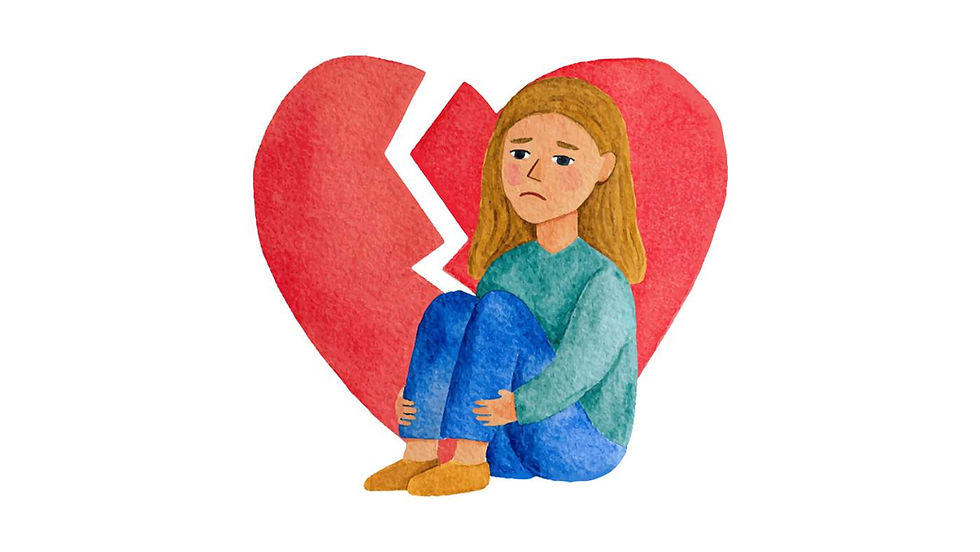Challenging 3 Myths about Grief from a Grief Therapist in Westchester, NY
- Jan 10, 2023
- 4 min read
Updated: Sep 24, 2023

Grief is something that we will all experience at least once in our lifetime (but most likely more than once). There are some myths about what grief is or what it should look like that can cause people to feel like they're not "doing it right".
The truth is, there is no "right" or "wrong" way to experience grief.
Here are 3 common myths that need to be addressed in order to create space for compassion and support toward yourself and others experiencing grief.
Grief Myth #1. "Grief happens in 5 Stages"
In 1969, Elizabeth Kubler-Ross published her book: "On Death and Dying." In this book she coined what is called "The Five Stages of Grief". These include:

1. Denial: Characterized by feelings of shock and numbness, and disbelief. An attempt to believe that the loss does not actually exist. *Different from dissociation*
2. Anger: Expression of extreme emotional discomfort. Anger can be directed toward self, others or even the one we have lost.
3. Depression: The reality of the loss begins to settle in, and feelings of intense sadness and often isolation follows.
4. Bargaining: Feelings of desperation and desires to change the reality of the loss. An example of this may look like: "But there are so many bad people in this world-what did (insert loved ones name) do to deserve this?!"
5. Acceptance: A place of not resisting the reality of the loss. Acceptance doesn't mean that we don't feel pain or that we 'like' the loss. It just means that we understand that it has happened and that we cannot change it.
It was believed that once you moved through one stage, that you would move to and through the next and so-on-so-forth. This is simply not true.
The reality is: Yes, we will likely experience these emotions as we process our loss- but it does not happen in chronological order. You may pendulate between "stages" and you may even experience these 5-stages all in one day or in one minute!
Grief is so unique it would be unfair to constrain it to 5 simple stages. This framework is meant to understand some of the common feelings experienced after grief, but not a time-line to "complete" your grieving journey.
Grief Myth #2. "The first year is the worst year"
Often you will hear people say, "The first year after losing a loved one is always the hardest." Although this may be true for some, it is not true for all.
During and after a loss we may experience dissociation. This dissociation helps us from being completely overwhelmed by our grief. It helps to temporarily numb us, disconnect us and in turn limit the intensity of our emotional state.
Dissociation after a loss may last longer for some than others. It can even last a year (or over a year.) With that said, when we are in dissociated states we are not processing our loss at the time of the loss but instead once our dissociative symptoms decrease or disappear.
Another reason why this myth is faulty is the existence of compounded grief.
Compounded grief is a series of losses that happen over a short period of time. (An example of this could be: losing a loved one and shortly after losing a pet, and just a few months later losing a job.) This makes the task of grieving complicated and often more intense. A more present day loss may trigger intense emotions around earlier losses that may have not been processed (because of lack of time or ability) at the time of that original loss.
Another reason why this myth is untrue is because, anniversaries, holidays, milestones and other events may stir up intense feelings of grief not only in the first year, but in the years to follow. These events may bring back the same or maybe even more intense emotions related to your grief year after year.

Grief Myth #3. "At some point you will 'get over' your grief"
Grief exists because love exists. Your love will not ever "go away" just because that person is not physically here. You will always love the ones you have lost- therefore, you will always grieve the ones you have lost.
Grief is not something we can ever "get over". Instead, we can learn ways to move through and with our grief. Over time your symptoms of grief may become less intense, or you may have found ways to make it more manageable- but there is no way of "getting over it".
You will have new experiences and continue to make meaningful connections all while carrying your grief. You will learn how to live with your grief and make meaning from your loss.
There is no cure to make grief go away. Grief doesn't shrink, but your capacity to handle it can (and will) increase over time.
Annabella Lipson is a Mental Health Counselor at Peaceful Living Mental Health Counseling in Scarsdale, NY.
She enjoys working with young adults & adults who are dealing with stress, anxiety, grief, PTSD and other challenges.
Annabella incorporates a combination of Cognitive Behavioral Therapy (CBT), Dialectical Behavior Therapy (DBT), EMDR Therapy, Ego-state Interventions and Mindfulness practices with her clients.





Comments